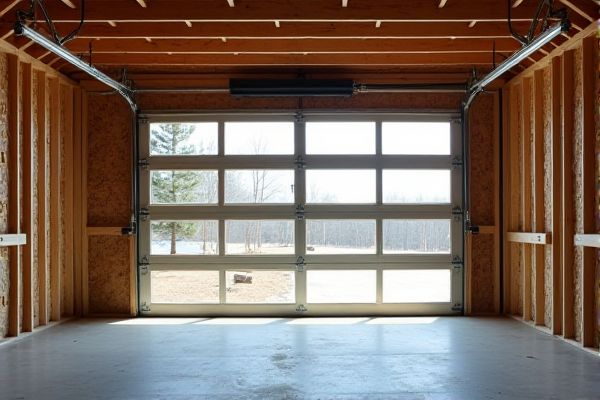
Insulated windows in your garage provide superior thermal efficiency by reducing heat transfer, helping maintain a more consistent indoor temperature and lowering energy costs compared to non-insulated windows. Explore the rest of this article to understand the benefits and considerations of choosing insulated versus non-insulated garage windows.
Table of Comparison
| Feature | Insulated Window (Garage) | Non-Insulated Window (Garage) |
|---|---|---|
| Thermal Performance | High insulation reduces heat loss and gain | Poor insulation, higher heat transfer |
| Energy Efficiency | Improves energy efficiency, lowers heating/cooling costs | Less energy-efficient, increases utility bills |
| Noise Reduction | Better soundproofing properties | Minimal noise reduction |
| Condensation Resistance | Reduced condensation, prevents moisture issues | Higher risk of condensation inside the garage |
| Durability | Enhanced durability due to multiple glass layers | Single glass layer, more prone to damage |
| Cost | Higher initial investment | Lower upfront cost |
| UV Protection | Blocks harmful UV rays, protects interiors | Limited UV protection |
Introduction to Garage Window Insulation
Garage window insulation significantly improves energy efficiency by reducing heat transfer, maintaining consistent indoor temperatures, and lowering energy costs. Insulated windows typically feature double or triple glazing with gas fills and low-emissivity coatings, providing superior thermal resistance compared to non-insulated single-pane windows. Choosing insulated garage windows enhances comfort, minimizes condensation, and increases durability against weather-related wear.
What Are Insulated Garage Windows?
Insulated garage windows feature multiple panes of glass separated by a layer of inert gas or air, enhancing thermal performance and reducing heat transfer compared to non-insulated windows. These windows improve energy efficiency by minimizing heat loss in winter and heat gain in summer, helping maintain a more consistent garage temperature. Choosing insulated garage windows can lower your energy bills and increase comfort inside your garage space.
Non-Insulated Garage Windows Explained
Non-insulated garage windows lack thermal barriers, resulting in higher heat transfer and reduced energy efficiency. These windows can cause increased temperature fluctuations, leading to higher heating and cooling costs in the garage. Choosing insulated options enhances temperature control, reduces condensation, and improves overall comfort in garage spaces.
Energy Efficiency: Insulated vs. Non-Insulated Garage Windows
Insulated garage windows significantly improve energy efficiency by reducing heat transfer through double or triple-pane glass and thermal seals, helping maintain consistent indoor temperatures. Non-insulated windows lack these features, resulting in higher heat loss during winter and increased heat gain in summer, which raises energy costs for heating and cooling. Installing insulated windows in garages enhances thermal performance, lowers utility bills, and contributes to overall home energy conservation.
Temperature Control and Comfort
Insulated windows provide superior temperature control by reducing heat transfer, helping to maintain consistent garage temperatures year-round. Non-insulated windows allow more heat to escape or enter, which can lead to fluctuating indoor temperatures and less comfortable conditions. Choosing insulated windows enhances your garage's energy efficiency and overall comfort.
Noise Reduction Benefits of Insulated Garage Windows
Insulated garage windows significantly reduce noise transmission compared to non-insulated windows by incorporating double or triple glazing with airtight seals that dampen sound waves. These windows use gas fills like argon or krypton between panes, enhancing acoustic insulation and minimizing external noise intrusion. As a result, insulated windows create a quieter garage environment, improving comfort and usability.
Cost Comparison: Upfront and Long-Term Savings
Insulated windows for garages typically have a higher upfront cost, ranging from 20% to 40% more than non-insulated windows due to materials like double glazing and thermal barriers. Over time, insulated windows contribute to significant energy savings by reducing heat loss in winter and minimizing heat gain in summer, potentially lowering heating and cooling costs by 10% to 25%. Non-insulated windows may incur higher long-term expenses due to increased energy consumption and potential wear on HVAC systems, making insulated options more cost-effective over the lifespan of the garage.
Durability and Maintenance Differences
Insulated garage windows offer enhanced durability due to their multi-pane construction and gas-filled spaces that reduce moisture buildup, preventing condensation and frame warping. Non-insulated windows often require more frequent maintenance because they are prone to temperature fluctuations that cause cracking, fogging, and seal failure over time. Your choice of insulated windows ensures longer-lasting performance and less upkeep in harsh weather conditions.
Aesthetic Impact on Garage Appearance
Insulated windows in garages provide a sleek, modern look with uniform glazing that enhances the overall curb appeal while offering improved energy efficiency. Non-insulated windows often have a simpler design that may appear less refined and can contribute to a dated appearance due to single-pane glass and less consistent framing. Choosing insulated windows creates a more polished and visually appealing garage facade that complements contemporary architectural styles.
Choosing the Right Window Type for Your Garage
Insulated windows for garages provide superior thermal efficiency, reducing heat loss and improving energy savings compared to non-insulated windows that offer minimal insulation benefits. Choosing insulated windows helps maintain a comfortable temperature year-round and prevents condensation buildup, enhancing durability and reducing maintenance needs. Your decision should prioritize insulation properties if your garage is climate-controlled or used frequently, ensuring long-term comfort and cost-effectiveness.
 homyna.com
homyna.com